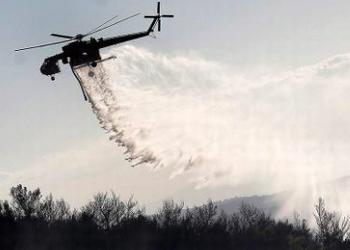
ATHENS, Greece, August 16, 2019 (ENS) – Hundreds of residents have been evacuated from towns, villages and a monastery on Evia, Greece’s second largest island, where fire has spread through a nature reserve in a dense pine forest.
At least 180 firefighters and water-carrying planes and helicopters are fighting the wildfire on the island north of Athens that has covered the Greek capital, 70 miles away, with smoke. The blaze has caused substantial damage to the mountain wildlife sanctuary of Agrilitsa, a protected forest listed in the EU’s Natura 2000 network.

The European Union has mobilized assets to respond to the Greek disaster to douse the forest fires ravaging the country. A total of 56 forest fires broke out around the country in a 24-hour period from Monday night.
More firefighters, planes and helicopters are struggling to contain a forest fire on the northern island of Thassos. A third wildfire is burning through brush and dry grass near Thebes, a city northwest of Athens.
Assets deployed by rescEU, the bloc’s new civil defence mechanism, include three planes developed to fight fires from reserve facilities in Italy and Spain.
Last December as the political consensus for rescEU was forming at the EU level, President Jean-Claude Juncker said, “A Europe that protects citizens has to be there in times of need. When there is a dangerous forest fire or a flood overwhelming national response, our citizens want action not words. rescEU will ensure concrete solidarity with our Member States hit by disasters.”
rescEU is a common European reserve of capacities to respond to disasters, including firefighting planes and other means to respond to situations such as medical emergencies or chemical biological radiological and nuclear incidents.
Member States co-finance the operational costs of rescEU capacities when used for the EU’s Civil Protection Mechanism operations, and also co-finance the development of rescEU capacities.
As part of the new plan, the EU also is stepping up disaster prevention and preparedness with support for Member States to improve their disaster risk management. The EU is establishing a simplified reporting framework, focusing on key cross-border risks and risks of low probability with high impact.
The Greek wildfires broke out early this week after a weekend of hot weather and strong winds, which have intensified the spread of the forest fires.
The EU’s Commissioner for Humanitarian Aid and Crisis Management Christos Stylianides is on the ground overseeing disaster response in Greece, along with newly elected Greek Prime Minister Kyriakos Mitsotakis, who canceled a planned summer holiday in order to supervise relief efforts and offer support to firefighters and affected communities.
Meanwhile, Copernicus, the EU’s satellite mapping facility, has been providing additional assistance in the form of damage assessment maps to better enable emergency workers to target fires and the destruction they cause.
Commissioner Stylianides said, “The EU stands in full solidarity with Greece at this difficult time. The planes are already in action, fighting the fires. This immediate response proves the added value of rescEU which makes our response more robust, quick and efficient.”
“Moreover,” said Stylianides, “this is a real example of the common European values on which rescEU is based: solidarity and protection of lives of our European citizens. I am thankful to Italy and Spain for their offers of assistance. We stand ready to provide further assistance.”
The EU’s mobilization of assistance towards the disaster response in Greece is the first practical deployment of resources through the rescEU mechanism, which is designed to strengthen the bloc’s capacity to respond to disasters and emergencies as a collective, providing mutual support and assistance between Member States.
Forest fires often break out in Greece during the hot, dry summer months. Officials continually warn people against any outdoor activities that could cause fires, such as campfires and barbecues. In the past, parks and forested areas have been closed to the public during the summer.
Last year, more than 100 people lost their lives when a forest fire near a seaside area northeast of Athens burned through a nearby settlement of holiday cottages.
Copyright Environment News Service (ENS) 2019. All rights reserved.
© 2019, Environment News Service. All rights reserved. Content may be quoted only with proper attribution and a direct link to the original article. Full reproduction is prohibited.
